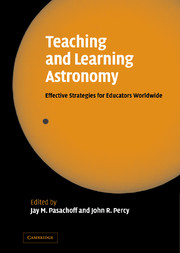Book contents
- Frontmatter
- Contents
- List of illustrations
- Preface
- Introduction
- Part I Astronomy in the curriculum around the world
- Part II Astronomy education research
- Part III Educating students
- Part IV Educating teachers
- Part V Astronomy and pseudoscience
- Part VI Astronomy and culture
- Part VII Astronomy in developing countries
- Introduction
- 15 Astronomy curriculum for developing countries
- 16 Science education resources for the developing countries
- Part VIII Public outreach in astronomy
- Part IX The education programs of the International Astronomical Union
- Part X Conclusions
- Author index
- Subject index
Introduction
Published online by Cambridge University Press: 18 May 2010
- Frontmatter
- Contents
- List of illustrations
- Preface
- Introduction
- Part I Astronomy in the curriculum around the world
- Part II Astronomy education research
- Part III Educating students
- Part IV Educating teachers
- Part V Astronomy and pseudoscience
- Part VI Astronomy and culture
- Part VII Astronomy in developing countries
- Introduction
- 15 Astronomy curriculum for developing countries
- 16 Science education resources for the developing countries
- Part VIII Public outreach in astronomy
- Part IX The education programs of the International Astronomical Union
- Part X Conclusions
- Author index
- Subject index
Summary
One of the International Astronomical Union's highest priorities is the worldwide development of astronomy. A substantial fraction of its resources is used for that purpose; the resources are administered through the IAU's Commission on Education and Development. At the 2000 General Assembly of the IAU in Manchester UK there was a three-day conference on “Astronomy for Developing Countries.” The proceedings were edited by Alan H. Batten, and published by the IAU in 2001. This book is the definitive guide to the topic. The IAU works closely with other organizations, such as the United Nations Office for Outer Space Affairs. This office has organized a series of workshops on basic space science, in various parts of the world, and astronomy is one of the topics covered. The government of Japan has generously provided small telescopes and planetariums to several developing countries. The Vatican Observatory organizes summer schools for graduate students and young astronomers from astronomically developing countries. The IAU International Schools for Young Astronomers (ISYA) take place every year or so somewhere in the world, and also involve graduate students and young astronomers. See www.astronomyeducation.org.
According to the StarGuides database maintained at the Strasbourg Observatory, there are approximately 100 countries in which there is some astronomical activity - either research or teaching, professional or amateur. In about 50 of these countries, astronomical activity is not sufficiently developed for the country to adhere to the International Astronomical Union (IAU), or there may be other factors that make IAU membership difficult. Their level of astronomy activity ranges from minimal to moderate.
Information
- Type
- Chapter
- Information
- Teaching and Learning AstronomyEffective Strategies for Educators Worldwide, pp. 195 - 196Publisher: Cambridge University PressPrint publication year: 2005
